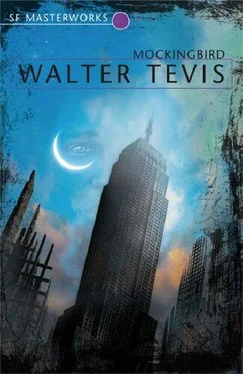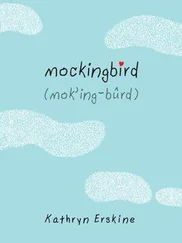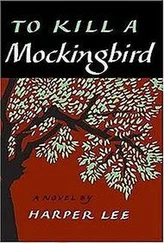Walter Tevis
MOCKINGBIRD

Science Fiction Masterworks Volume 70
The inner life of a human being is a vast and varied realm and does not concern itself alone with stimulating arrangements of color, form, and design.
Edward Hopper
In the last years of the twentieth century (as Wells might have put it), Gollancz, Britain’s oldest and most distinguished science fiction imprint, created the SF and Fantasy Masterworks series. Dedicated to re-publishing the English language’s finest works of SF and Fantasy, most of which were languishing out of print at the time, they were — and remain — landmark lists, consummately fulfilling the original mission statement:
‘SF MASTERWORKS is a library of the greatest SF ever written, chosen with the help of today’s leading SF writers and editors. These books show that genuinely innovative SF is as exciting today as when it was first written.’
Now, as we move inexorably into the twenty-first century, we are delighted to be widening our remit even more. The realities of commercial publishing are such that vast troves of classic SF & Fantasy are almost certainly destined never again to see print. Until very recently, this meant that anyone interested in reading any of these books would have been confined to scouring second-hand bookshops. The advent of digital publishing has changed that paradigm for ever.
The technology now exists to enable us to make available, for the first time, the entire backlists of an incredibly wide range of classic and modern SF and fantasy authors. Our plan is, at its simplest, to use this technology to build on the success of the SF and Fantasy Masterworks series and to go even further.
Welcome to the new home of Science Fiction & Fantasy. Welcome to the most comprehensive electronic library of classic SFF titles ever assembled.
Welcome to the SF Gateway.
Walking up Fifth Avenue at midnight, Spofforth begins to whistle. He does not know the name of the tune nor does he care to know; it is a complicated tune, one he whistles often when alone. He is naked to the waist and barefoot, dressed only in khaki trousers; he can feel the worn old paving beneath his feet. Although he walks up the middle of the broad avenue he can see patches of grass and tall weeds on either side of him where the sidewalk has long before been cracked and broken away, awaiting repairs that will never be made. From these patches Spofforth hears a chorus of diverse clickings and wing rubbings of insects. The sounds make him uneasy, as they always do this time of year, in spring. He puts his big hands into his trouser pockets. Then, uncomfortable, he takes them out again and begins to jog, huge and light-footed, athletic, up toward the massive form of the Empire State Building.
The doorway to the building had eyes and a voice; its brain was the brain of a moron—single-minded and insensitive. “Closed for repairs,” the voice said to Spofforth as he approached.
“Shut up and open,” Spofforth said. And then, “I am Robert Spofforth. Make Nine.”
“Sorry, sir,” the door said. “Couldn’t see…”
“Yes. Open up. And tell the express elevator to be down for me.”
The door was silent for a moment. Then it said, “Elevator’s not working, sir.”
“Shit,” Spofforth said. And then, “I’ll walk up.”
The door opened and Spofforth walked in and headed across the dark lobby toward the stairway. He muted the pain circuits in his legs and lungs, and began to climb. He was no longer whistling; his elaborate mind had become fixed narrowly now upon his annual intent.
When he reached the edge of the platform, as high above the city as one could stand, Spofforth sent the command to the nerves in his legs and the pain surged into them. He wobbled slightly from it, high and alone in the black night, with no moon above him and the stars dun. The surface underfoot was smooth, polished; once years before Spofforth had almost slipped. Immediately he had thought, in disappointment, If only that would happen again, at the edge . But it did not.
He walked to within two feet of the platform’s limit, and with no mental signal, no volition, no wish for it to happen, his legs stopped moving and he found himself, as always, immobilized, facing Fifth Avenue uptown, over a thousand dark feet above its hard and welcome surface. Then he urged his body forward in sad and grim desperation, focusing his will upon the desire to fall forward, merely to lean his strong and heavy body, his factory-made body, out, away from the building, away from life. Inwardly he began to scream for movement, picturing himself tumbling in slow motion, gracefully and surely, to the street below. Yearning for that.
But his body was not—as he knew it would not be—his own. He had been designed by human beings; only a human being could make him die. Then he screamed aloud, throwing his arms out at his sides, bellowing in fury over the silent city. But he could not move forward.
Spofforth stood there, alone on top of the tallest building in the world, immobilized, for the rest of the June night. Occasionally the lights of a thought bus would be visible, slightly larger than stars, below him, moving slowly up and down the avenues of an empty city. There were no lights on in the buildings.
And then, as the sun began to illuminate the sky over the East River to his right and over Brooklyn, to which no bridges ran, his frustration began to ebb. Had he been given tear ducts he would, then, have found the release of tears; but he could not cry. The light became brighter; he could see the outlines of the empty buses below him. He could see a tiny Detection car moving up Third Avenue. And then the sun, pale in the June sky, burst up over an empty Brooklyn and sparkled on the water of the river as fresh as at the dawn of time. Spofforth took a step backward, away from the death he sought and had been seeking all his long life, and the anger that had possessed him began to ebb with the rising sun. He would go on living, and he could bear it.
He climbed down the dusty staircase slowly at first. But by the time he reached the lobby bis footsteps were brisk, self-assured, full of artificial life.
As he left the building he told the speaker on the doorway, “Don’t let the elevator be repaired. I prefer the climb.”
“Yes, sir ,” the door said.
Outside, the sun was shining brightly and there were a few humans on the street. An old black woman in a faded blue dress happened to brush Spofforth’s elbow, looked up dreamily at his face. When she saw his marking as a Make Nine robot she immediately averted her eyes and mumbled, “I’m sorry. I’m sorry, sir.” She stood near him, at a loss. She had probably never seen a Make Nine before and only knew about them from her early training.
“Go on,” he said gently. “It’s all right.”
“Yes, sir,” she said. She fumbled in her dress pocket and pulled out a sopor and took it. Then she turned and shuffled off.
Spofforth walked briskly, in sunshine, back down toward Washington Square, toward New York University, where he worked. His body never tired. Only his mind—his elaborate, labyrinthine, and lucid mind—understood the meaning of fatigue. His mind was always, always tired.
Spofforth’s metal brain had been constructed and his body grown from living tissue at a time, long before, when engineering was in decline but me making of robots was a high art. That art too would soon decline and wither; Spofforth himself had been its highest achievement. He was the last of a series of a hundred robots designated Make Nine, the strongest and most intelligent creatures ever made by man. He was also the only one programmed to stay alive despite his own wishes.
Читать дальше












